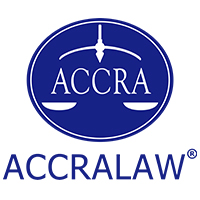The Metro Manila Subway project is just one of the many lined-up under the current administration’s “Build, Build, Build” programme. The programme intends to address the country’s looming infrastructure problems, such as heavy Metro Manila traffic.
At present, the country funds its cash-intensive projects through taxes, official development assistance financing, and commercial loans. With taxes being a primary source of funding, the administration introduced the Comprehensive Tax Reform Programme (CTRP), which intends to generate a sustainable stream of revenues for the government’s infrastructure and social projects to ultimately accelerate poverty reduction.

Associate
ACCRA Law Offices
The CTRP is divided into four packages. Package 1 covers the Tax Reform for Acceleration and Inclusion (TRAIN) Law on individual taxation and value-added tax, which became effective on 1 January 2018. With the CTRP, the government expects to collect an additional PHP79.01 billion (US$1.52 billion) in revenue.
The president then approved Package 1B, or the Tax Amnesty Law, which became effective on 24 April 2019. Package 1B was intended to boost tax collection by granting amnesty to taxpayers by paying a percentage of the unpaid tax liabilities. This way the government aims to raise revenue while cutting down on collection costs.
The Tax Amnesty Law covers estates and delinquent taxpayers. Unfortunately, the president vetoed the general tax amnesty because of a lack of safeguard measures against tax evasion rooted in bank secrecy. As such, only delinquent taxpayers and estates can avail of the tax amnesty.
Tax amnesty on delinquency covers tax cases that were not elevated to the courts, tax cases under investigation and those pending with the courts, and final and executory cases on or before 24 April 2019. The delinquent taxpayer has to pay 40-100% of the basic tax assessed, with the surcharge and interest waived by the government.
Estate tax amnesty covers unpaid estate taxes of decedents who died no later than 31 December 2017. The estate only has to pay 6% (which is lower than the old estate tax rate of 20%) on the previously undeclared estate.
Delinquent taxpayers can avail of the tax amnesty until 24 April 2020, or one year after the effectivity of Revenue Regulations No. 4-2019, while estates can avail of the tax amnesty until 15 June 2021, or two years after the effectivity of Revenue Regulations No. 6-2019. With the Tax Amnesty Law, the government expects to collect PHP27.54 billion in revenue.
CTRP’s Package 2 pertains to the Tax Reform for Attracting Better and High Quality Opportunities Bill (Trabaho). The Trabaho Bill is still in the pipeline and has not yet been passed by congress. It aims to make the corporate tax system simpler, fairer and more transparent, and will lower the corporate income tax rate from 30% to 25%. This will also modernize the fiscal incentives granted to corporate entities.
Package 2+ includes tax reforms on the mining sector and so-called sin taxes (levied on goods deemed harmful to society and individuals). The former aims to introduce a single fiscal regime for all types of mining businesses in order to promote fairness in the industry. The latter, on the other hand, will create additional source of funds for the present administration’s Universal Health Care plan.
CTRP’s Package 3 aims to broaden the tax base of properties and property-related taxes. This will effectively increase the government’s collection of real property taxes. Finally, Package 4 will reform the existing taxes imposed on products offered in the financial market.
While the hope of generating tax revenues to finance infrastructure programmes through the tax reform packages is sound and logical, the actualization of the vision and its implementation have been far from ideal. In total, it has taken about a year-and-a-half to substantially implement CTRP’s Package 1. (To date, the major reform on the Bureau of Internal Revenue’s Electronic Sales Reporting System has not been implemented.) Moreover, the reported marginal collections in 2018 attributable to Package 1 have only been PHP41.9 billion.
Considering that the government intends to spend around US$158 billion on infrastructure projects in the next five years, and the actual amount of funds collected under the CTRP, it is undeniable that the CTRP alone is not a sustainable source of funding for the government’s “Build, Build, Build” programme.
Kelvin Y Hung is an associate with the tax department at ACCRALAW

ACCRA Law Offices
22nd Floor, ACCRALAW Tower, 2nd Avenue corner
30th Street, Crescent Park West, Bonifacio Global City,
1635 Taguig, Metro Manila, Philippines
Contact details:
Tel: +63(2)830-8000
Email: kyhung@accralaw.com
www.accralaw.com



























